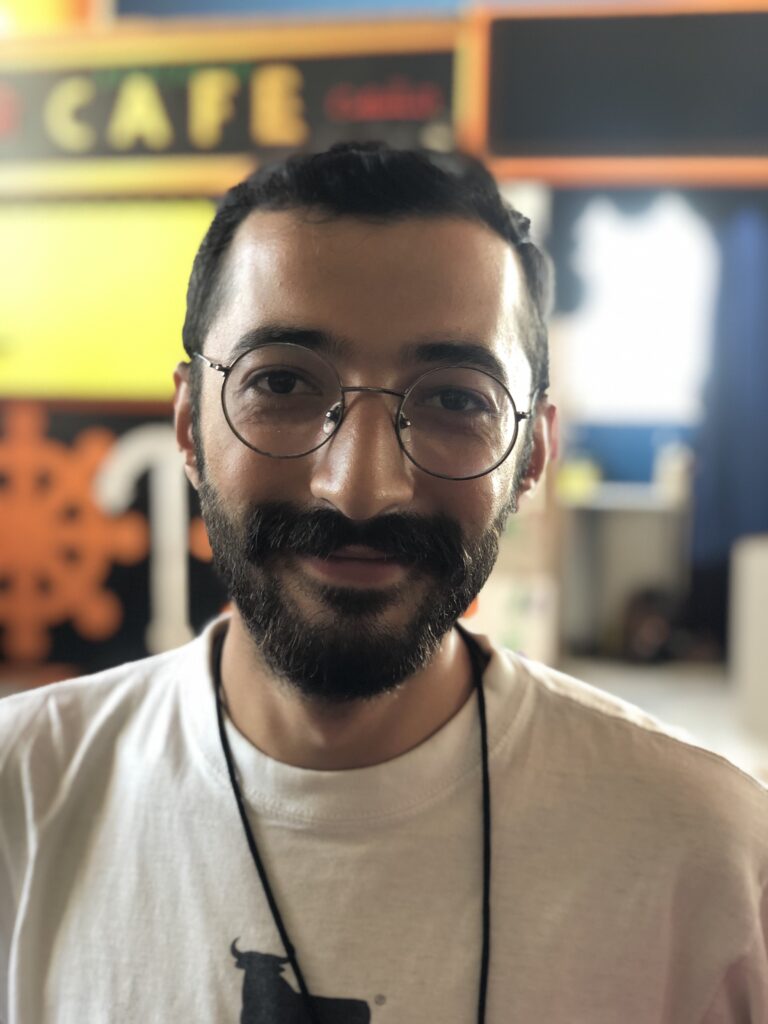
Ramo – a happy, positive minded teacher and barber shop manager – but also a dancer, cleaner (yes, we know that dish washing wasn’t your favourite daily task) and on his last day he even joined our security team!
In total Ramo stayed with us for around 2 months – but it felt like he’s been with OHF a lot longer. Thank you Ramo for being such a good support and for all of your energy!
Get an insight into Ramo’s volunteering experience at OHF with the following interview made during the end of his stay at our Community Centre:
This is my most memorable moment:
There are many, one of them happened just yesterday. I’m currently helping in the adult school as an English teacher, but my students didn’t know that I will be leaving in two weeks. Yesterday I told them that I’ll be leaving when they asked me about the registration for the next class. There was a family, they’re all students, but it’s a family: a mother and two daughters, they cried because they wanted me to be their teacher for the next level. I felt like I will be leaving them, I’ve never been a teacher before, but me being here and teaching them English is so important for them. I will never forget this moment.
This struck me the most:
The so called “Life-jacket graveyard”: When I saw this place, I was with 4 other volunteers. We went to see Molyvos and other nice places – quite a touristic weekend but on the way towards Molyvos we wanted to see the view. We then saw the life-jacket graveyard, I hadn’t heard about it before. Seeing all these life-jackets dumped onto hills felt like a huge slap in the face in terms of humanity!
One Happy Family is…
For me its one of the things where the name explains it best. It is seriously One Happy Family! I understood it just recently. I thought a lot about the system with our partners, of how we work with the helpers, of how the food grows in the garden and then we use it for the kitchen. The plastic spoons from lunch are reused for some art and garden projects. Broken machines from the barber will be brought to the makerspace and they fix it. All of this is One Happy Family, it’s like a life-circle.
This is what I would like to tell other people:
As a volunteer there are many duties when we go back to our homes: not all of them have to be about One Happy Family but I really would like to tell the reality of the so called “refugee crisis” here. There is nothing more on the media and yet they are thousands of people seeking asylum here, living in one of the worst refugee camps in the world. I heard about Lesvos and Moria before my stay here, but I had no idea how bad the situation really is.
We will have a special presentation on our faculty at university because this is my internship, so I will use this presentation to explain to others:
I will explain the system of OHF, how it functions: “MIT ihnen statt für Sie, with them instead of for them” – I want to explain this system. In my opinion this works perfectly – it IS possible! So this model could be applied elsewhere where migration and immigration are a topic.
My tasks in One Happy Family are…
The first three weeks I did only daily tasks, I liked the bank a lot. They offered me then to teach in the adult school and we reopened the helpers English classes. I’m thus mainly busy with the school. Between this time I try to help with the other tasks: I like the bank, so I do it as well.
I’m also serving food for the kids – It’s easy and fun for me.
I also now have the responsibility for the barber shop: so I’m in close contact with our barbers.
What do you think makes One Happy Family different from other similar organizations?
Working WITH the people, but this is maybe the most common answer.
It’s an NGO working with many partners on one place. I can imagine that this is very challenging: working with many but not having conflicts. It’s amazing how it functions!
And working with 65 helpers at the moment, they take their jobs very seriously and they know their work so well. This willingness of the helpers, to improve and to produce something impresses me as well. Also the visitors, this connection between volunteers, helpers and visitors: people take care of the place of OHF, they want it. I see many visitors taking care of the place: helping with cleaning etc.
What motivated you to stay long-term and why do you think it is important that volunteers stay for a long time?
Long-term volunteers take over more responsibilities: for example if the teacher changes every two weeks the students will be confused. It depends on the tasks, the daily tasks can be done as well by short termers, but there are many tasks that need more responsibility.
You can make the place better than before only with the long-term volunteers. And you’ll understand everything much better than the short termers, you’ll know as well the short cuts for many things, which makes you more helpful for the organization. 🙂
And Ramo added…
It’s gonna be probably one of the unique experiences in my life, even though I used to live in a refugee environment almost all my life. I wasn’t expecting to have such an amazing experience where I learned a lot, I’m very grateful for this.
I saw the migration crisis with my own eyes now.,plus in addition I could do it in an NGO that makes this experience much more valuable. Thanks to EVERYONE!
